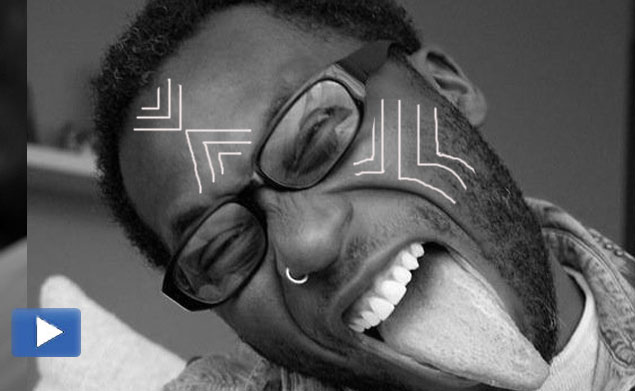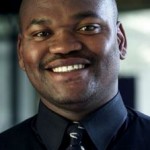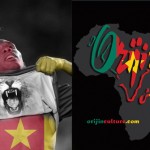
The album is dead. iTunes killed it. Blaming Steve Jobs and Co. for the plethora of awful LPs being released might be a stretch, but let’s face it, artists, especially MCs, are making better singles than full lengths. 88-Keys is an exception though – this veteran’s first album is one of the best and most original LPs I’ve heard in the past few years. Every song fits into the story arc and no beat or lyric feels out of sync or place. Albums such as The Death of Adam restore my faith in the power of a great LP. Read on and get familiar with 88-Keys, a truly unique talent with a story to tell.
Where does the name 88-Keys come from?
It was given to me by the Large Professor when I was 14 or 15 years old. There are 88 keys on a grand piano and when we first met I was making beats at my friend’s house on a keyboard sampler and he walked in and just started freestyling. There were no introductions, he didn’t know my name so he called me 88-Keys in his freestyle and he’s the Large Professor from the group Main Source, one of the greatest groups of all time. So I always felt like I would go by that name if I was to ever make it in this business as a producer or whatever.
Who is 88-keys?
I am a music producer, hip-hop artist, D.J and somewhat of a singer.
Which of these hats do you wear more easily?
Music production is actually my first talent; I didn’t pick up rapping until before my album came out.
What made you feel like rapping would be a good thing to try out?
When one of my best friends, Kanye West, strongly convinced me to put a rap that I had on the album. Initially, my album was mainly instrumental. So we debated for a bit, then I came around to agreeing with him and it was one of the best decisions I made.
How did you get your first big break?
I consider my first big break to be when I sold beats to J-Live and Mos Def for both of their first albums. The checks that I received from them were so large, considering my age at the time, I was 18 or 19 years old and it didn’t take me long to make the beats that they bought from me, because making beats for me is pretty second nature. I couldn’t believe that I worked on a beat for an hour and got paid so much.
How did you approach making The Death of Adam?
If you listen to the album and strip away the lyrics, the beats themselves are telling the story of The Death of Adam. And in fact, there are two songs, which are instrumentals, which exemplify that. I just made beats that told the story.
What’s the story behind The Death of Adam,
It’s a conceptual album, it’s the story of Adam, a young man who’s thinking with the wrong head, and it eventually leads to his death. It’s how he dies that’s the whole clincher and twist to the story.
I came up with the concept based off one sample which I worked on, which became the song “There’s Pleasure” which wound up on the album. I made the beat and in the earlier stages of the beat, it was annoying because every two bars there was a voice saying “pleasure, there’s pleasure”. So I tried to think about what gives me pleasure and I was going through my mental rolodex of all the things that give me pleasure and that other people could relate to and the one that felt the most universal was sex. So I decided that’s what this song will be about and then I moved on to working on another beat which somehow wound up pertaining to the same subject matter. At first I thought it was just a weird coincidence, but then when the same thing happened to the third song I was working on, that’s when I felt like it was a sign that this was what my album had to be about.
What emotions do you want listeners to have after listening to it?
Enjoyment and satisfaction. I always felt that if I was to ever become an artist I would have something to say. Not necessarily a preachy message or socially conscious, but if I have a platform to say anything, I’m going to say something rather than just rap and make words rhyme together. As funny or as dope as the songs came out, I want people to think like damn, next time I lay down with someone I’m not committed to or married to, I should make sure that we’re both protected. It’s like a cautionary tale. I tried to do it in a friendly and joking way and I hope that people look past the jokes and take heed to my message
 What is your background or Orijin?
What is your background or Orijin?
I am Cameroonian. I am the only one in my immediate family to be born on American soil though, I was born in the Bronx.
Has Cameroonian culture influenced your music at all?
I would say no, I come from a family of doctors, so if anything, it hindered my musical start. My family did not want me to be in the music industry whatsoever. So I had to force my way in and break the chains. They all love it now though, so it’s all good.
How did your Cameroonian background affect your childhood?
It was pretty rough, living in New York in the early 80s. Anybody who wasn’t an African-American or Jamaican would get made fun of. So I got made fun of to a point where I used to be ashamed of being Cameroonian – the whole African booty scratcher jokes, the whole spear chucker jokes, you got bones through your noses and big lips jokes, I’ve heard every single joke directed to Africans that people come up with. Back then in the 80s, you had to develop a thick skin to not lash out, which I didn’t for the most part. Either I ran home and cried or it actually sharpened my skills with just snapping on people. If somebody made fun of me because I’m African then I would just pick them apart and it made me quick on my toes where I could just snap on somebody. It just sharpened up my wit and I guess it helped me be a better rapper because now I base a lot of my lyrics on wit rather than just talking about nothing. If I’m gonna talk about something, I try to do it as clever and witty as possible.
When Obama won, a lot of Africans celebrated his victory as their own, what was your reaction?
I felt like it was a big step for mankind, not just black people or America, just in general. I knew that, no to beat a dead horse with this phrase, but I knew that a change did happen. I am really removed from politics, but I was happy that he won didn’t get cheated out of the election and all that. I guess what my whole thing was, in the back of mind, it was like okay, now that he’s elected, let’s get over the fact that he’s a black man or quote unquote black man because he’s actually half white, now let’s get down to business.
Back to music, what are your professional goals for the next five years?
I want what most musicians want, I’d like to grace the stage at the Grammys one day and be a recipient of those awards, because I know with those awards for the most part comes more opportunities to further your career and make money. And you know money is always good. It’ll allow me to not only help out my immediate family, but also friends, and help out people who are in need.
What are your interests outside of music?
Shop for Ralph Lauren Polo clothing, hang out with my wife and daughters, watch TV shows with my wife, like Law & Order: SVU and Lost.
Let’s say I only have $10, enough for one album, why should I buy The Death of Adam?
Musically, the production is awesome, damn near flawless, the features are so diverse and each artist is so incredibly talented, just the features alone should be enough for someone to pick up the album. And then there’s me as an artist. My raps are very clever, I deliver a message, and I have something to say. I am not rapping for the sake of rapping. When you spend $10 on my album or if you go to Best Buy, $13.99, (laughs), you get more than dope beats and dope rhymes, you get a message out of it as well, and it’s a message, that anyone at any age can apply to their personal lives and they can relate to, both male and female – it’s very entertaining.
Words: Jimmy Ngokwey
Latest posts by cadmin (see all)
- The Story of a Ghetto Boy - June 28, 2015
- The Rise of The Next Gen. Marley’s | Bob Marley’s grandsons (VIDEO) - May 8, 2015
- Meanwhile somewhere in Sweden, these Swedish African dancers… - March 24, 2015



![Reblog this post [with Zemanta]](http://img.zemanta.com/reblog_e.png?x-id=cc729183-368e-4915-9e7d-e935b3c974a7)

